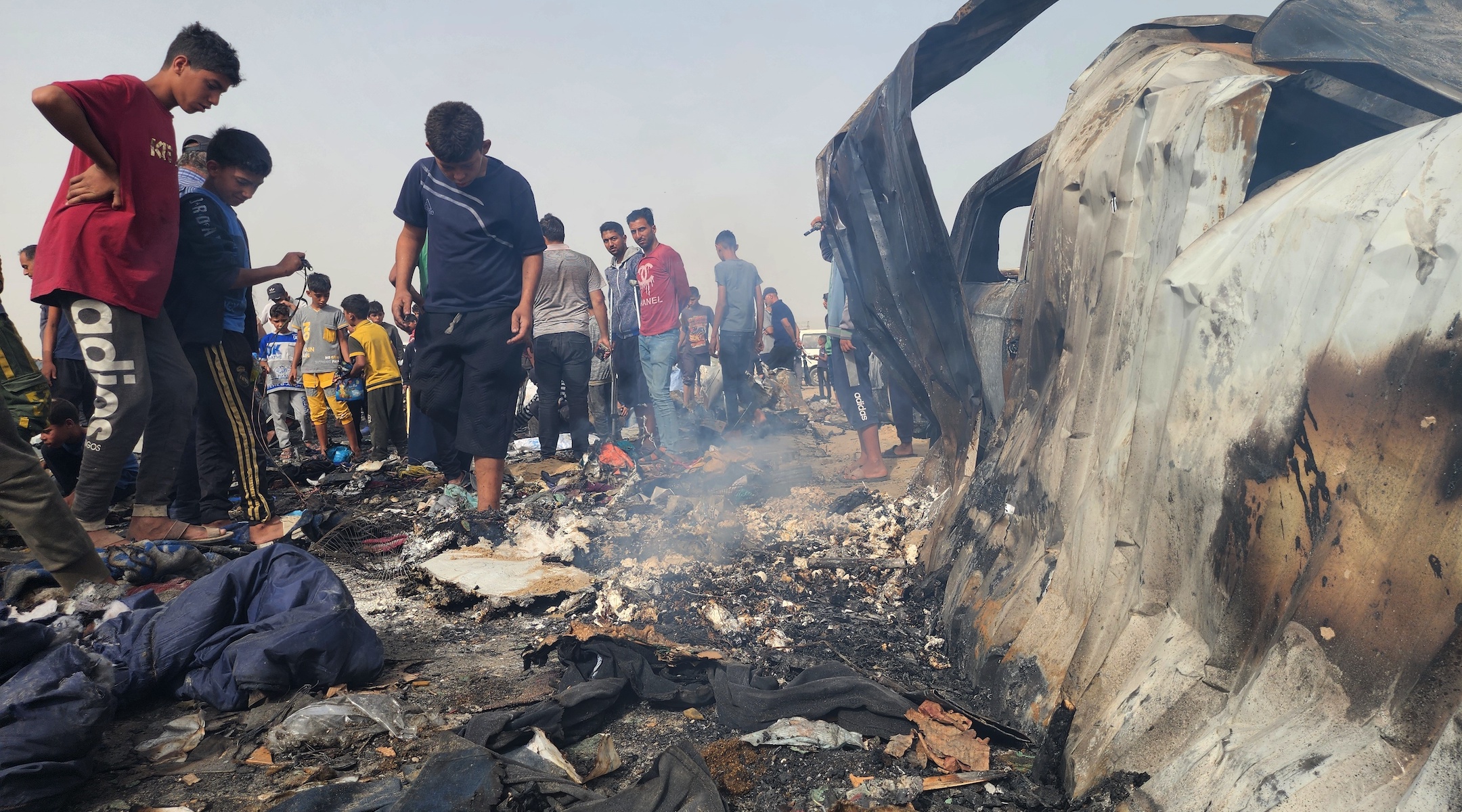Israeli strike kills dozens in displaced persons camp in Rafah, prompting IDF investigation
The strike came days after a ruling by the International Court of Justice in the Hague ordered Israel to halt its invasion of Rafah, which began earlier this month

An Israeli strike on a displaced persons camp in Rafah, targeting Hamas leaders, killed dozens on Sunday, May 26. (Hani Alshaer/Anadolu via Getty Images)
(JTA) — An Israel Defense Forces strike targeting Hamas leaders in a displaced persons camp in Rafah killed dozens of people on Sunday, heightening concern over the civilian toll in the battle over the city in southern Gaza.
As of Monday afternoon, the number of people killed in the strike had risen to 45, according to the Hamas-run Gaza health ministry, and hundreds were wounded.
On Monday, the IDF said that the strike killed two officials in charge of Hamas’ terror attacks in the West Bank, and was “carried out against legitimate targets under international law.” But the IDF’s lead prosecutor, Maj. Gen. Yifat Tomer-Yerushalmi, said in a speech on Monday that the military was committed to fully investigating the incident.
“Naturally, in a war with this scope and intensity, difficult events also occur, like the event yesterday night in Rafah, which was very difficult,” she said. “The IDF regrets any harm to noncombatants over the course of the war.”
The strike came days after a ruling by the International Court of Justice in the Hague ordered Israel to halt its invasion of Rafah, which began earlier this month. The ruling, handed down on Friday and condemned by Israel, is unenforceable but is likely to increase pressure on Israel to cease or curb the operation.
Israel says the invasion is necessary to defeat Hamas’ remaining organized military forces in Gaza, but has drawn opposition internationally, including from Israel’s allies, because more than a million civilians had taken refuge in Rafah. Some 800,000 have fled the city since the beginning of Israel’s invasion.
In the wake of Sunday’s strike, the European Union said it would bring back its mission at the Rafah border crossing into Egypt, which it ended in 2007 after Hamas’ military takeover of the territory. The Biden administration, meanwhile, told the Times of Israel, “We’re aware of the reports about the incident in Rafah and are gathering more information.”
The incident also came after Hamas rockets targeted central Israel for the first time in months, and as Israel is preparing to restart negotiations with Hamas over a ceasefire and hostage release deal. Israel’s government, led by Prime Minister Benjamin Netanyahu, has faced mounting backlash over its approach to the talks, with a lead negotiator reportedly remarking that reaching a deal would be impossible under Israel’s current leadership.
And Gadi Eizenkot, a lawmaker and former IDF chief of staff, reportedly told a parliamentary committee that Israel should pause the war to get the remaining hostages out. More than 120 hostages are estimated to remain in Gaza, with as many as 100 thought to be alive. More than 100 were released in exchange for hundreds of Palestinian security prisoners during a ceasefire in November.
““Just as we stopped for a truce last time, we can suspend the fighting and return to it for as long as it takes to achieve the goals of the war,” Eisenkot reportedly said.
The war began on Oct. 7 when Hamas invaded Israel, killing approximately 1,200 people and taking some 250 hostage. Israel then invaded Gaza, and according to the Gaza health ministry, some 36,000 people have since been killed in the fighting. Israel says roughly a third of that number are combatants. More than 280 IDF soldiers have been killed since the invasion began.
This article originally appeared on JTA.org.



















